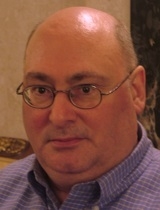Danny Flamberg is known as the “Manhattan Marketing Maven,” and he has more than 25 years experience as online marketing strategist. He has helped start-ups become important players in their markets and helped leading global brands extend their reach, market share and relationships with customers. In this Practical eCommmerce Profile, Flamberg offers expert advice for online business owners.
PeC: Describe your typical day.

Danny Flamberg
Flamberg: “I’m on the phone, on teleconferences, and in meetings all day. From banks and pharmaceutical companies to small firms just getting off the ground – I advise, plan, strategic, plot, query, poke, prod and connect people with the resources they need to succeed.”
PeC: In these troubling economic times what is the number one thing e-merchants should be doing from a marketing perspective?
Flamberg: “Keeping your clients close to you is the most effective way to survive the recession. Shoppers who have purchased from you recently have a higher propensity to do it again. Be sure you are communicating with your customer base. Show them the love because they will return it faster and at less cost than new customers will.”
Secondly, “Emphasize whatever you have that’s on sale. Everyone is looking for a deal. … If you’re not out there waving a flag around your sale items – get on it.”
PeC: What about operations?
Flamberg: “Now’s the time to streamline your business … and make life for your customers easy. Look carefully at click streams and navigational paths. Look for product cognates and buying patterns and put things together for your customers. Do the math for them. … If you don’t invest the time, you won’t make the money.”
PeC: What should e-merchants not be doing?
Flamberg: “There’s a lot of people out there thinking that they need a redesign or total change because they’re tired of how the site looks or feels. Remember, the DJs at the radio station get tired of the songs long before the listeners. Look at your traffic levels and click-thru rates and remember that keeping people on the site longer may not result in more sales.
“Also, keep in mind your realistic capabilities and be skeptical about new technologies and functions that are going to be enormous financial investments. … With any upgrades or added features, ask yourself, ‘will it make enough people buy more to justify the cost?'”
PeC: You’ve been on marketing’s cutting edge for 25 years. What do you see as the key principles that have not changed in that time?
Flamberg: “The key principles never change:
“1. Know your customer. When I worked with [women’s apparel store] Ann Taylor, we had Ann as our target customer. If Ann wouldn’t wear it, we didn’t sell it. You need to know your customer’s demographics, psychology and habits.
“2. Watch your customer like a hawk. Customer influences change over time. Just because Ann wouldn’t have worn it last year, doesn’t mean she won’t this year.
“3. Keep an eye on the culture. Think about how the skateboarding culture has influenced clothing choices, color combinations, and the buying habits of teens and young adults over the last few years. The same is true with Asian culture—with anime and manga. … What are the cultural icons doing? Tap into it if you can.”
PeC: Speaking of popular culture, what is your take on Facebook, Twitter and other social media?
Flamberg: “You know, it’s really hard to tell. They’re great tools to get your brand out there, but do people really buy because of them? … I am a fan of brands and organizations, and I follow them on Twitter, but I think you need to incorporate a strategy of growing your brand but then driving people to buy in order for them to be effective.”
PeC: What makes you buy?
Flamberg: “In the last two weeks, I’ve bought from five sale emails. I’ll buy because of a product review or a good blog post about something.”
PeC: Any final advice to our readers?
Flamberg: “There’s a zillion great ideas, but … which are going to pay off? … Remember, building relationships does more for sustainability, for your business than pay-per-click advertising and customer acquisition.”



